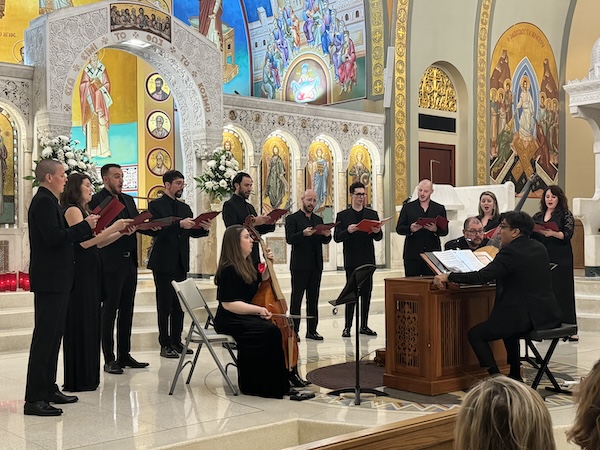Seraphic Fire explores intriguing rarities of Schein and Johann Christoph Bach

Ruben Valenzuela conducted Seraphic Fire Wednesday night at St. Sophia Greek Orthodox Cathedral in Miami. Photo: Sophia Vidali/SF
Bach and Telemann are often considered the fathers of German Baroque music. Nearly a century before Bach, however, Johann Hermann Schein (1586-1630) was a leading creative light of the early Baroque era.
Seraphic Fire explored Schein’s legacy Wednesday night at St. Sophia Greek Orthodox Cathedral in Miami. Guest conductor Ruben Valenzuela led six motets from Schein’s The Fountains of Israel, interspersed with choral works by Johann Christoph Bach.
Valenzuela, founder and director of Bach Collegium San Diego, opened the program with “Ich lasse dich nicht, du segnest mich den” (I will not let you go until you bless me) by J.S. Bach. His even balancing of the ten voices was impressive in the contrapuntal segment, with individual lines emerging clean and transparent.
The strength of Schein’s choral writing prefigures J.S. Bach and his contemporaries. If there is one distinct influence in his work, it is Monteverdi but Schein was an original voice who could not be mistaken for that Italian master. His writing is alternately reverent and celebratory.
In the initial “O Herr, ich bin dein Knecht” (O Lord, truly I am your servant) of The Fountains of Israel, Valenzuela captured that duality. He drew full-voiced resonance and tight ensemble from the choir. Throughout the concert, Valenzuela conducted from the organ, where he shared continuo accompaniment with Sarah Stone (on viola da gamba) and John Lenti (playing several permutations of the lute). Their supple blending and sensitive underscoring with the singers was skillfully accomplished.
“Die Jakob vollendet hatte,” Schein’s narrative of Jacob’s last moments, was grand in structure and depth of emotion. Valenzuela elicited a wide range of dynamic contrasts and subtle vocal effects. Robust articulation characterized the joyous aura of “Dit mit Tränen säen,” with the climax resounding splendidly in the sanctuary’s resonant acoustic.
The men’s voices were impressive in the alternating male-female patterns of ”Zinn sprecht.” Monteverdi’s influence was most evident in the shining textures of “Der Herr denket an uns und segnet uns” (The Lord has been mindful of us), which showcased superbly disciplined singing.
The selections by Johann Christoph Bach (1642-1703), J.S. Bach’s cousin. tended to be more formal in the manner of later composers but demonstrated the beauty of his invention. The large-scale “Der Mensch, vom Weibe geboren” (Man, born of woman) was surprisingly lively and animated since the text repeatedly intones man’s eventual death. Soprano Elijah McCormack’s solo was marked by clarity and precision in the top range and Valenzuela maintained a vigorous pace in this work.
The hymn-like opening of “Lieber Herr Gott, weche uns auf” (Dear Lord God, wake us up ) was rollicking. “Es ist nun au smit meinem Lieben” (Now my life is ended) is a farewell to life in the most calm and serene terms. Bach’s moving and uplifting writing was imbued with angelic purity by the singers, with Molly Quinn’s crystalline soprano rising above the group gloriously.
In this concert of highly difficult material, the choir acquitted itself superbly. There are four remaining performances of this unique program, spotlighting a gifted conductor and the Seraphic Fire vocalists at their best.
Seraphic Fire repeats the program 7 p.m.Thursday at Vanderbilt Presbyterian Church in Naples; 7:30 p.m. Friday at St. Philip’s Episcopal Church in Coral Gables; 7:30 p.m. Saturday at All Saints Episcopal Church in Fort Lauderdale; and 4 p.m. Sunday at All Souls Episcopal Church in Miami Beach. seraphicfire.org
Posted in Performances
Leave a Comment
Thu Mar 21, 2024
at 11:17 am
No Comments





